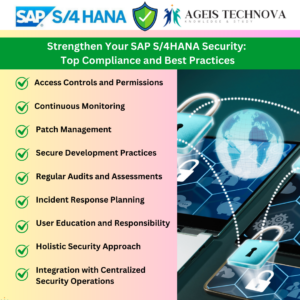Key Takeaways:
- SAP S/4HANA security protects sensitive data and ensures compliance.
- Best practices include strong access controls, monitoring, and patch management.
- Regular audits and secure development practices are vital for ongoing security.
- Incident response plans and user education are key to handling security breaches.
- A holistic security approach is essential for comprehensive protection.
- Ageis Technova offers expert SAP training in Delhi, Noida, NCR, and Gurgaon.
- Contact +91-74287 06064 for SAP training and skill development.
What is SAP S/4HANA Security and Compliance Management?
SAP S/4HANA Security and Compliance Management is about protecting SAP systems and ensuring they follow laws, regulations, and industry rules. This includes keeping sensitive business information secure. Stop unauthorized access and regularly checking systems for any threats or weaknesses. This helps ensure that everything is safe and up to the required standards.
Why SAP S/4HANA Security and Compliance Management is Important?
- Protects Sensitive Data: SAP S/4HANA systems store crucial data like financial records, employee information, and customer details. Protecting this data prevents theft and misuse.
- Prevents Unauthorized Access: Strong security measures in SAP S/4HANA ensure that only authorized users can access sensitive information, reducing the risk of cyberattacks or internal misuse.
- Ensures Legal and Regulatory Compliance: SAP S/4HANA security helps businesses meet industry-specific data handling rules, preventing legal issues and penalties.
- Reduces Cyber Threats: Regular monitoring and security checks in SAP S/4HANA help detect and stop cyberattacks such as hacking, malware, or data breaches before they cause damage.
- Maintains Business Continuity: A secure SAP S/4HANA system ensures smooth business operations without disruptions caused by security incidents or system failures.
- Builds Trust and Reputation: Strong security practices show customers, partners, and stakeholders that their data is secure, boosting the organization’s reputation.
Best Practices for SAP S/4HANA Security and Compliance Management

- Access Controls and Permissions:
Set strict access controls in SAP S/4HANA so users only have the permissions they need for their roles. Regularly review user roles and responsibilities to ensure the proper segregation of duties and avoid conflicts of interest. - Continuous Monitoring:
Use tools that monitor user activity in real-time within SAP S/4HANA to quickly detect suspicious behavior. Enable the SAP Security Audit Log (SAL) in SAP S/4HANA to track security-related events and maintain a detailed activity history. - Patch Management:
Keep your SAP S/4HANA system updated by applying the latest security patches from SAP. Regular updates prevent vulnerabilities and help keep your system secure. - Secure Development Practices:
Use secure coding practices, particularly when developing custom ABAP code within SAP S/4HANA. Regularly check for coding errors and address security gaps early in the development process. - Regular Audits and Assessments:
Conduct periodic security audits of your SAP S/4HANA system to ensure it complies with internal policies and external regulations. Perform risk assessments to identify critical vulnerabilities and assets, and take necessary actions to enhance protection. - Incident Response Planning:
Develop a clear incident response plan for SAP S/4HANA with defined roles, responsibilities, and communication procedures. This helps you respond quickly and reduce damage in case of a security breach. - User Education and Responsibility:
Educate all employees about SAP S/4HANA security best practices and the importance of following established policies. Remind them that everyone plays a role in keeping the system secure. - Holistic Security Approach:
Ensure a comprehensive approach to SAP S/4HANA security that includes system configurations, network settings, database management, and compliance with security standards like NIST CSF or OWASP. - Integration with Centralized Security Operations:
Connect your SAP S/4HANA security systems with a centralized Security Operations Center (SOC) for better threat detection and faster response to security incidents.
FAQs
Q1: What is SAP S/4HANA Security and Compliance Management?
A1: SAP S/4HANA Security and Compliance Management ensures that SAP systems are secure and comply with legal, regulatory, and internal policies. It focuses on protecting sensitive data and preventing unauthorized access.
Q2: Why is SAP S/4HANA Security and Compliance Management important?
A2: It protects sensitive data, prevents unauthorized access, ensures compliance with regulations, reduces cyber threats, maintains business continuity, and builds trust with customers.
Q3: What are some best practices for SAP S/4HANA Security and Compliance Management?
A3: Best practices include access controls, continuous monitoring, patch management, secure development, regular audits, incident response planning, user education, a holistic security approach, and SOC integration.
Q4: How does SAP S/4HANA Security protect sensitive data?
A4: SAP S/4HANA security uses strong access controls, encryption, and monitoring to ensure sensitive data is protected from unauthorized access and threats.
Q5: How often should I perform security audits for SAP S/4HANA?
A5: Security audits should be performed periodically, typically annually, or more frequently if there are major updates or changes to regulations.
Q6: What is the role of user education in SAP S/4HANA security?
A6: User education helps prevent security breaches by teaching employees security best practices, like recognizing phishing attacks and following access controls.
Q7: What is SAP Security Audit Log (SAL) in SAP S/4HANA?
A7: The SAP Security Audit Log (SAL) records security-related events in SAP S/4HANA, helping track and analyze user activities to detect any anomalies or threats.
Q8: How can I manage access permissions in SAP S/4HANA?
A8: Access permissions in SAP S/4HANA should be based on the principle of least privilege, ensuring users only have the access they need for their roles, and regularly reviewing and adjusting permissions.
Q9: What is incident response planning for SAP S/4HANA?
A9: Incident response planning for SAP S/4HANA involves creating a detailed action plan to manage and mitigate security breaches, including defining roles, responsibilities, and communication procedures during an incident.
Q10: How can SAP S/4HANA help with regulatory compliance?
A10: SAP S/4HANA ensures compliance by implementing security measures that meet legal and industry-specific regulations, providing audit trails, and enabling automated reports for compliance management.
Conclusion:
SAP S/4HANA Security and Compliance Management is essential for safeguarding sensitive business data, ensuring regulatory compliance, and mitigating risks. By following best practices like strong access controls, continuous monitoring, and regular audits, organizations can strengthen their SAP security posture and maintain business continuity.For those seeking comprehensive SAP training, Ageis Technova offers the best courses in Delhi, Noida, NCR, and Gurgaon. Our expert-led training in S/4HANA, MM, FICO, HR, PP, and ABAP ensures that you gain the skills needed to excel in SAP security and compliance.
Call us today at +91-74287 06064 to get started!
👉 Join SAP Community : AGEIS TECHNOVA



